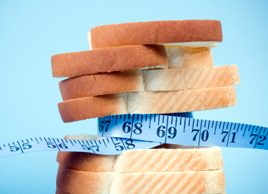The truth about carbs
How do you know if a low-carb diet will work for you? Here’s how to lose weight by eating the right carbs for your DNA

Source: Your Health: What Works, What Doesn’t
Even now that the low-carb craze has died down, today’s dieters fear potatoes more than last week’s mystery meat. But "to carb or not to carb?" is the wrong question. As with most things in life, it’s the quality (of your carbs) that counts more than the quantity. Lentil soup, anyone?
Do low-carb diets work?
Answer: Yes. People lose more weight during the first six months of a low-carb diet than they do on other kinds. But after one year, the various diets even out.
There are countless variations of the low-carb diet. Some plans allow all the cheese, bacon, and Béarnaise sauce you can eat, while others limit food loaded with saturated fat in favor of skinless chicken breasts and low-fat cottage cheese. The common denominator: They all restrict carbs and help dieters shed pounds, at least in the short term.
There’s little doubt that low-carb diets speed initial weight loss. In one recent study published in the American Journal of Clinical Nutrition, after 12 weeks on a low-carb plan, study participants lost an average of 10.8 pounds compared to 5.5 pounds for those on a low-fat diet.
It’s little wonder these diets work: A low-carb diet is basically a low-calorie diet with a high protein content. Sure, removing a bun from a burger, eating a salad instead of fries, and opting for diet soda over regular makes for a lower-carb meal, but it’s also a lower-calorie meal. What’s more, low-carb diets are typically easier to stick with because the protein and fat in these plans help dieters feel full. In one study, during a 12-week phase of unrestricted total calorie intake of a high-protein, low-fat diet, researchers found that people spontaneously ate 450 fewer calories per day and reported feeling more satisfied than those on a high-carbohydrate diet.
But here’s the catch: Studies show that at one year, the weight loss on a low-carb diet tends to equal that on a low-cal diet, possibly because people get tired of eating breadless sandwiches and shunning rice.
Are low-carb diets more effective for some people than for others?
Answer: Yes. What it takes to fit back into your skinny jeans is as much about your other genes as about what you put in your mouth.
Why can your best friend hit the bread basket before dinner without gaining an ounce, while the mere thought of crusty rolls causes your thighs to expand? It boils down to the hormone insulin, which escorts blood sugar into cells for energy and storage. Some people are genetically programmed to react to carbohydrates by secreting an oversize dose of insulin’and they will probably benefit most from a low-carb diet.
A study published in the Journal of the American Medical Association found that after 18 months, high insulin secretors dropped about 13 pounds on a low-carb diet compared to a 2.5-pound drop for high insulin secretors on a higher-carb, lower-fat diet, even though both groups cut out the same number of daily calories (about 400). Lower insulin secretors lost the same amount of weight on either diet.
How do you know if your DNA fits the bill? Look in the mirror. If you store fat in your belly (an "apple" body shape), you’re more likely to secrete excess insulin than if you store fat in or around your hips (a "pear" body shape). For a more scientific approach, pull out a tape measure and measure your waist at the belly button. Then measure your hips at their widest part (where your derriere is largest) and divide your waist measurement by your hip measurement. For women, a result of 0.8 or less indicates a normal or low insulin secretor; for men, it’s 0.95 or less.
If eating carbs makes you hungrier, or you have frequent cravings for rice, pasta, and the like, that’s another sign you’re a high insulin secretor. Try cutting back on carbs and replacing white breads, pastas, and grain products with whole grain foods. If your cravings diminish, chances are you’ve found a winner!
Do low-carb diets stress the kidneys?
Answer: No. If you don’t already have a kidney problem, you’re not likely to develop one from a low-carb diet.
A diet low in carbs is automatically higher in the other two macronutrients: fat and protein. Some experts worry that the extra protein may tax the kidneys; after all, these organs are responsible for breaking down protein. But there’s no scientific research to back that theory. In a study of 1,624 women, Boston researchers found no association between high protein intake and declining kidney function in women with healthy kidneys.
Processed foods and refined grains may be the primary reason for the obesity epidemic.
That said, people with existing kidney problems should steer clear of low-carb plans. The less work you give the impaired organs to do, the better. When the body breaks down protein, it forms substances that change damaged kidneys’ structure and function, promoting further damage.
Are diets with a low glycemic index the best approach for most people?
Answer: Yes. More and more experts agree that a low-glycemic diet is an effective way to lose weight.
Not long ago, health experts recommended a low-fat, high-carb diet for optimal health and weight management. But people ballooned, and carbs took the brunt of the blame. Specifically, it was the types of carbs people gorged on, like french fries, mashed potatoes, and hamburger buns’in other words, starchy foods and refined grains stripped of their fiber and other nutrients ‘ that were the likely culprits. Because these foods digest quickly and convert easily into glucose, or blood sugar, they cause blood sugar and insulin surges that lead to insulin resistance and weight gain, or so the theory goes.
Those white buns and white potatoes rank high on the glycemic index (GI), a measure of how quickly a food is broken down into glucose. The reference point is pure glucose, which is arbitrarily scored as 100. The higher the GI, the greater the blood sugar spike a food causes.
Thanks to our penchant for processed foods and refined grains, the GI of our diets has increased dramatically over the past 30 years. In fact, some experts believe this is the primary reason for the obesity epidemic, along with increasing portion sizes.
Australian researchers evaluated several studies comparing low-GI and high-GI diets and found that people who ate a diet with a low GI lost an average of 2.5 pounds more than people who ate a higher-GI diet over periods ranging from five weeks to six months. One likely reason: Low-GI diets assuage hunger by keeping blood sugar levels relatively steady. In a study of 39 overweight or obese people published in the Journal of the American Medical Association, Boston researchers found that participants on a low-GI diet reported less hunger than those on a low-fat diet. Their metabolisms slowed less, too (recall that dieting eventually slows metabolism, so the body burns fewer calories ‘ one reason people have such a hard time losing weight).
Don’t miss out! Sign up for our free weekly newsletters and get nutritious recipes, healthy weight-loss tips, easy ways to stay in shape and all the health news you need, delivered straight to your inbox




